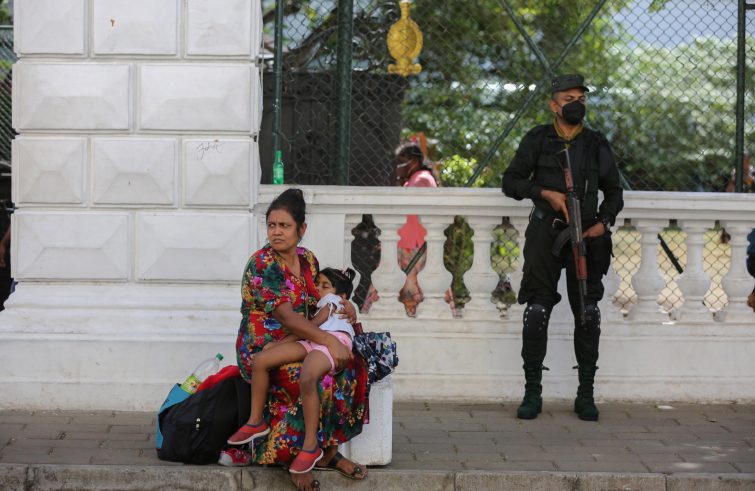
“Everyone is waiting for the President to resign. He promised he would because that’s the only way we can move forward, to bring about a marked change of direction for the country.” In a telephone conversation with SIR, Cardinal Malcom Ranjith, Archbishop of Colombo, calls for the resignation of the President of Sri Lanka, Gotabaya Rajapaksa. The President left the country a few hours ago on a military plane that landed in the Maldives following a popular uprising in Colombo last Friday, July 9. The population accused him of being responsible for the country’s severe economic crisis. “Friday’s protests were to be expected – the Cardinal points out – the people of Colombo are weary and discouraged by the policies pursued by the incumbent president and his government.” Unfortunately, the situation in Colombo remains tense. Over the past few hours police officers have been firing tear gas to hold back thousands of protesters gathered in front of the Prime Minister’s office. Protesters are demanding the resignation of Prime Minister Ranil Wickremesinghe and President Gotabaya Rajapaksa.
Your Eminence, what is happening at the moment?
“A decade ago, the Country was in relatively good shape. But today it is in total ruin, with the economy at zero growth. There is no money, there are no funds to purchase fuel and gas, basic necessities to live a normal life are in short supply.
Everything is at a standstill. There are no jobs and many households lack the financial resources to maintain their family’s livelihood, with many children struggling, parents crying because they don’t know what to do.
Everyone was waiting for the government to resign. The people had been asking the President to step down for a very long time, but he did not. Finally, on Friday July 9, a large number of people, coming also from other towns across the country, gathered in Colombo to stage a protest. Approximately one million people took to the streets. A few of them broke in and stormed into the President’s house, the office, the Prime Minister’s house.
Who are the biggest victims of this maladministration?
Most of all, families that were poor already and were finding it hard to make ends meet. However, over the last few years, this population segment was joined by middle-class citizens who lost their jobs, have no source of income and have also fallen into poverty. A large part of the population is plagued by the crisis. Children and young people are amongst the victims of this zero-growth economy. The country’s healthcare system is likewise extremely problematic.
Hospitals are running out of medicines with the risk that some may even lose their lives because they cannot be treated.
What are the people’s requests?
They want a more transparent, more open, more democratic government, and a society where everyone abides by the law in a fair and equitable manner. It is unacceptable that one person, simply by virtue of their political power, is allowed to be above the law. The law must apply equally to everyone. The people call for a society where the fight against corruption is taken seriously.
Instead, today we see rampant corruption at all levels of society. We have a ruling class that stole and hoarded money and, by using financial loopholes, moved that money abroad. People are requesting a more transparent political system.
What would you like to say to your country’s political leaders?
Our only plea is for the leadership to understand that, for the first time in 74 years of independence from British rule, a government has been toppled by people’s protest. This makes it clear that it may happen again in the future if our governments and leadership fail to adopt a transparent, open and democratic stance. That is our appeal.
How could a fresh start come about?
Future developments also depend on the drafting of a new Constitution, since the current one stipulates an overly powerful presidency that puts too much power in the hands of one person. This must change.
We must move towards a more democratic and open parliamentary democracy. Amendments to the Constitution are critical to Sri Lanka’s future. However, under the Constitution we now need to elect a temporary president who may run the country until the incumbent president’s term of office ends in order to move the Country forward.
On Sunday, the Pope renewed his appeal for peace in Sri Lanka. To what extent are the Holy Father’s words important?
It was a strong voice for us as it has always been.
We received great support from the Holy Father. He visited our country during one of his first visits in 2015. He then honoured us with his presence at the beginning of his Pontificate. And later on, Francis expressed his solidarity in the wake of the 2019 Easter attacks, and sent us funds to treat the victims. He recently encouraged me to go to Geneva to ask the High Commission for Human Rights for a more transparent inquiry. In Rome, the Holy Father received a group of victims of those attacks. That meeting took place on April 25 and in St Peter’s Basilica all of us bishops celebrated a Holy Mass. The Holy Father has consistently been a source of strength for us and we are very grateful to him.









